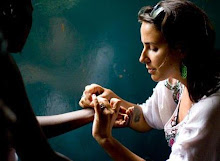To explain the title of this blog, it comes to mind because I on the podcast, the speaker said something along these lines when telling the history of the Netherlands. But the idea that there is no ultimate reality, no Great Story, no absolute truth, is something I have come to believe more and more throughout my college years.
I find this idea especially fitting after viewing Submission (I'm going to stick to discussing Submission rather than Fitna to narrow my scope a bit). It is really fascinating for me to see these films and to read Murder in Amsterdam, which give an overall negative view of Islam -- because I am also taking a class Contemporary Cultures of the Middle East, and everything we read and learn gives a view that is quite opposite.
To be honest, I am perplexed by Islam. On the one hand, I read accounts from Muslim women who argue that veiling is not an act of obedience to men, but a practical way to navigate public, to protect the intimacy between husband and wife; modern or "new" veiling is also, by many accounts, the lifestyle choice made by college-educated urban women. I also have read that working is not desirable to many Muslim women, as they point out how Western women are exploited with lesser pay and a second shift at home. And while family-arranged marriages are still practiced, women increasingly are choosing their own husbands. And there is Submission. This woman tells the story of a forced marriage, being ripped from her lover, beaten by her husband who disgusts her, and raped by a family member. She is trapped behind her veil, barred from seeing the world and pursuing her dreams.
There is also the view that, yes, Muslim societies oppress women, but this is not rooted in Islam. It is a major argument that in the Golden Age of Islam, men and women were equal, and that this oppression results from the misinterpretation and manipulation of the Quran by men to justify and maintain a patriarchal society. Therefore it is not Islam the religion, that is inherently sexist and hateful (and as argued by some Dutch people, incompatible with their tolerant culture). In fact, one quote from the book, Peoples and Cultures of the Middle East by Daniel G. Bates and Amal Rassam, has been lingering in my mind since I read it:
"Just as Christianity is not invoked to explain features of Western societies, such as colonialism, racism, and the Holocaust, Islam likewise cannot be considered as determining all the characteristics of societies in the Middle East."
These are but a few different perceptions of Islam and its oppression of women. How can one possibly come to a conclusion as to what the "true story" really is? Are Muslim women being oppressed to the point of suffocation, and in need of some intervention, or is this "saving" simply a new form of colonial feminism?
My reaction, in sum, is just... I don't know.
Wednesday, April 9, 2008
Subscribe to:
Post Comments (Atom)

2 comments:
Thoughtful post, Cassie. The quotation from Bates and Rassam synthesizes the point interestingly (what page is it: give us that when you quote, however informally). It's interesting to connect this point with Ran's remark about history being comprised of stories. The issue of relativism (which I take to be one aspect of Ran's point) does not necessarily equate with the issue of totalization, though--that's what I'm getting from the quotation. Or if it does, how?
Regardless, go for context: MIA isn't about Islam (I'm responding to yr seeing the book as "giv[ing] an overall negative view of Islam"; it's about a series of cultural perceptions of it, many of which are in direct conflict, and how those tensions ripple through a city, country, world.
Obviously, you've got me thinking.
OK; I'm still thinking. It also seems important to examine how the book deals with the issue of representation, or representativeness (is this "about" Islam; is this about Islam in Amsterdam): this picks up on what some folks were saying in class last Wed. re. Submission as totalizing the Muslim female by having different stories read by a single voice. Even the possibility of the existence of "the" Muslim female may understood as a categorical mistake: "there is none," could go one argument. ("The" female? "The" Muslim?)
On the one hand, the allure of humanism is that we have things in common: but where does that stop being an ethical, moral, or social good and become a form of reductiveness--and misrepresentation, with the loss of particularities becoming wounding? And this class is "about" Amsterdam: is such a thing possible? Well, it is because we're doing it--the virtues of pragmatism, which would say there is no hypothetical, only particulars--but these questions must emerge.
Post a Comment